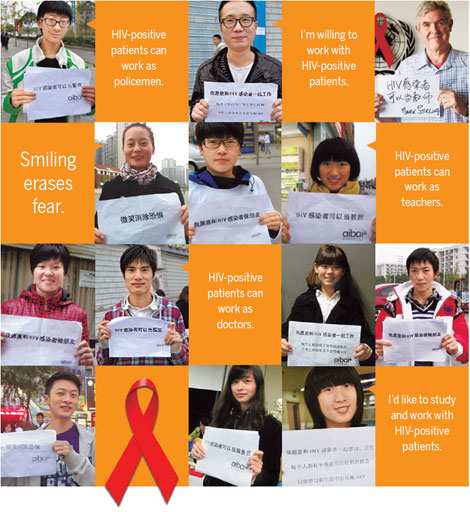It's right to work
Updated: 2011-12-01 07:40
By Zhang Yue (China Daily)
|
|||||||||

Tianxiagong has organized a petition calling for equal rights for HIV-positive job seekers after helping a patient take a discrimination case to court in 2010. Zhang Yue reports.
A petition from more than 12,000 people was sent to the Ministry of Human Resources and Social Security and the Ministry of Health on Tuesday, to mark World AIDS Day on Thursday, calling for equal rights for HIV-positive job seekers. The petition, called "One photo for each, smiling to support equal working rights for HIV carriers", was initiated by Tianxiagong (Justice for All), a Nanjing-based NGO promoting welfare, benevolence and equality. Campaign participants typically take a picture while holding a piece of paper saying they are willing to work with HIV/AIDS patients.
A Tianxiagong spokesperson commented this was one of the country's biggest campaigns calling for equal working rights for HIV patients. Some HIV-positive individuals took part in the campaign.
"The petition is scheduled to arrive on Thursday, which is World AIDS Day," says Yu Fangqiang, coordinator of the organization.
"We wanted to raise social awareness about giving HIV-positive job seekers equal opportunities through this campaign."
Photos of the campaign were quickly published on micro blogs. The first photo on the Sina Weibo micro blog platform was retweeted 600 times that day.
UNAIDS, the Joint United Nations Program on HIV/AIDS, got involved in the campaign at the end of September and also published photos on its micro blog.
Yu and his colleagues have been working to bring equal justice for HIV-positive job seekers since 2010. The organization assisted the first case of discrimination against HIV-positive job seekers on the Chinese mainland that went to court in Anhui province in October 2010.
The plaintiff was a 23-year-old man identified only by his alias of Xiao Wu.
The man was denied a teaching job by the Anqing education department in August 2010 because he tested positive for HIV, after passing written exams and interviews.
He was rejected on the basis that civil servants must pass a medical exam.
Huge media attention at home and abroad surrounded the case, and media organizations ranging from CCTV to The New York Times interviewed Xiao Wu.
He told China Daily it took him months to decide to take legal action, as he was afraid of his personal information being released during the court hearing.
"I could not even think about what my life would be like if people knew I had AIDS," he said.
The court ruled against him one month after the case was first heard.
"It took me a long, hard time to accept this result," Xiao Wu says. "And my life has not changed much so far. Some reporters said they would keep in touch with me after the interview, but hardly anyone did. And I can understand that really. Who would want to talk to a guy with AIDS?"
He worked as a teacher at a private middle school in his home county earlier this year, earning about 1,500 yuan ($235) per month. He changed to another private school in the city over the summer because it paid 2,500 yuan per month.
After the trial, Xiao Wu says he often overheard people gossiping about the case in streets and restaurants. This was another reason he wanted to move to the city.
None of his friends or relatives - even his parents - are aware he has AIDS.
His health, meanwhile, is deteriorating. He started to take free medicine regularly provided by the government in 2011.
"The medicine's side effects include nausea and dizziness," he says. "And once you take the medication, you cannot stop. So I carry my medicine wherever I go. I tell people that they are vitamins if they ask about it."
The private schools he has worked at did not provide him with health insurance.
"I seldom dare to think about the future," he says. "Yet even now, my only wish is that job discrimination against HIV-positive job seekers will be reduced. Then, I could get a better, more stable job. At the moment, I face the risk of losing my job anytime. I do not have a contract."
Though he says he often feels that his situation is helpless and he gets depressed, he adds that he was glad he had the medical examination that revealed he had AIDS.
"I would not know that I have AIDS otherwise," he says. "Though I was not able to work as I wished, I was able to get treatment."
Tianxiagong coordinator Yu Fangqiang has been trying to help Xiao Wu since the court case.
"It was a landmark for HIV-positive job seekers," he says. "Since his case was filed, another two HIV patients in Guizhou and Sichuan provinces also took legal action against job discrimination. But they were quickly forgotten after the hearings."
Xiao Wu says Yu is one of the few people he can talk to about his future plans.
He recently watched the movie Philadelphia, which tells a story similar to his own.
"I could not finish watching it because I didn't want to learn how I would end up," he says. "But the man won his rights in the end. For me, I am still waiting, looking forward to the change."











